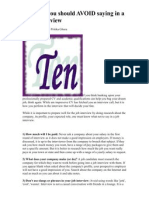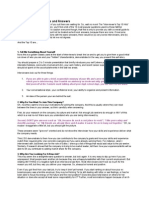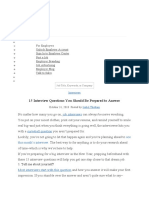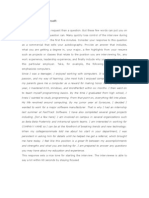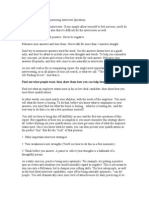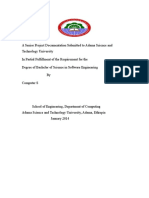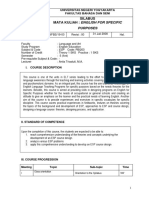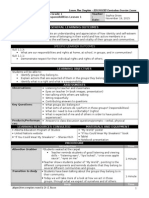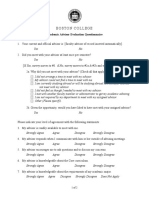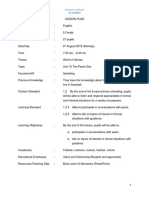15 Things you should never say in an interview!
1. My last boss was terrible.
Never say negative things about your past coworkers, managers or bosses. Since outsiders dont know the
whole situation, you risk looking like you are the troublemaker. Also, the interviewer might know the people
you are talking ill about. Worse, he might actually be good friends with them. That never makes for a good
impression.
2. Ill do anything you want.
Employers hire people for their specific skills and strengths. Showing any sign of desperation will turn off
the employer. They will worry that if they hire you, you will leave for a better job since you were so
desperate. Being flexible in your role is essential to your career success, but that is very different from
coming on too strong about how much you need a job.
3. Its on my resume.
Interviewers have multiple candidates, and it is hard to keep track of the details of all of them. Some
interviewers might not have the chance to review your resume. The interview is your chance to help them
understand why you are the right person for the job. Plus, wouldnt it be anyway better to be thorough with
your resume? You wrote it, after all.
4. I dont have much experience but
Dont focus on the negatives. Your job is to convince them to hire you! Concentrate on your personal
achievements that demonstrate willingness to learn, persistence, and interpersonal skills. Your
achievements can be in school, a team project, volunteering, or part-time work. Your job is to make them
understand that your lack of experience will not affect your performance.
5. My greatest weakness is striving for perfection.
This has been said many times before to interviewers. What it might mean to the employer is that you are
inefficient and take too long to accomplish a task. In business, efficiency and quality are the key, not
perfection (unless you work for Apple or another company famous for perfection). Remember, in most
cases, done is better than perfect.
6. I think outside the box. or Im a team player.
Employers are tired of hearing these things from candidates. Instead, you need to back these statements
up with concrete examples. I started an accounting system for the startup I worked for last year by finding
the right application and filling in our financial transactions. sounds better. Claiming youre good at
something and not giving the employer a reason to believe you, will probably land you nowhere.
7. Um, I dont know.
When an unexpected question stumps you, you should ask for a minute. Good interviewers will appreciate
a well-composed answer after a minute rather than a jumbled answer you blurt out. Sometimes, coming to
an answer isnt everything. Think out loud. Let employer know what your thought process is, and how you
approach a problem. Logical thinking and attempting to solve a problem might just come in handy to
impress the employers. H
8. How much vacation time do I get?
You havent even started working and youre thinking of holidays already?
9. How soon will I be promoted?
Like the last question, the interviewer will feel like you are focusing on the benefits for yourself. You have
not even contributed to the organization in any way and already asking for a promotion.
Instead, you can ask Can you tell me the typical career path in this company for someone in this position?
This shows that you are committed to staying at the company for the long haul.
10. Do you know when well be finished here?
Expect your interview to take at least 60 minutes. Do not schedule anything before 3 hours after the start
time of your interview.
What to do if your interview goes way past the scheduled time, and you have to go? You should graciously
say, Im so glad you have taken the time to meet with me. I have to leave for my next class in 15 minutes. I
wish I can stay longer. What else would you like to know about me? I would be happy to fill in any gaps
before I go.
If you are a student, interviewers will understand you will have classes and exams that you should not
miss. Another option is to excuse yourself to the washroom and see if you can reschedule your next
appointment.
�11. Im going through a tough time right now.
Interviewers are not interested in your problems or your personal life. They will sympathize with you, at
some level, yes, but on a professional level, they will worry that your personal problems will affect your
work performance.
12. I am following up again.
If you follow up with your interviewers too many times, you will seem desperate, and you will annoy them.
After your interview, send a thoughtful follow up note. After 2 weeks, you can follow up again to ask for the
timeline for the hiring decision. After a month, you can send a final email reiterating your interest and ask if
a hiring decision has been made.
An employer is not going to forget about hiring a great candidate. The hiring process might be stuck in
bureaucracy. If they are interested in hiring you, you will know about it.
13. Um, I was, like, the team captain of the, um, school football team.
Using too many interjections such as um or like will make you sound less confident. Interviewers will
have trouble understanding your main points. Practice your answers to common interview questions.
Pause to think before you answer.
14. No, I dont have any questions.
If you dont have any questions for the employer, you risk looking like you are uninterested in the job. After
all, you have to spend most of your time there, you should be curious. You can ask about the company
culture, your managers managing style, the challenges facing the team, and the goals of the company.
15. I went to Disneyland last summer.
Steer away from bringing up personal stories unless your interviewer asks you for more details.
Some interviews might be very informal (especially startups). You might connect with the
interviewer by sharing personal stories, but that is very rare. Unless youre making a point towards
the end, dont spiral out of control with
�5 questions to ask yourself before an interview.
I think my job interview was good, I think they liked me, I did not fumble while answering any questions,
but alas, you did not make it to the other side. Why?
90% of candidates get rejected at the interview stage, i.e. 1 out of 10 chances of success. Three years of
assisting our clients like PepsiCo., HCL, Channel V and Flipkart, shortlist interns has helped us zone in on
the following 5 key characteristics that make 10% of the candidates who get selected, stand out!
Passion: This is probably the most common word you will hear from successful people and
organizations. If what you love doing as a person, what you are good at and what the job demands are
congruent, you score high on this critical aspect. Passion must match both required skills as well as
your acquired skills.
Cultural fit: Work culture is the most distinct feature of each organization. It is what makes Google one
of the best places to work at. An organization where your personality and attitude match with that of the
larger team is the best fit for you. A highly hierarchical firm might work fabulously for someone who
finds comfort in order and processes, while an organization with a small group of like-minded
employees will work brilliantly for people who thrive as self-starters and collaborators. Find a culture
that suits your value system and communicate what makes you a good fit for that organization.
Skill sets: Dont mistake skills for academics. Focus on personal traits that will add value to the job
communication, learning, hard work, motivation, excellence, clarity, adaptability, eye for detail. These
are skills which are hard to acquire, but can help you across a wide spectrum of opportunities. One
cannot be good at all; define your top three skills and focus on industries and opportunities that require
these in abundance.
Sincerity: If you can show diligence, sincerity and professionalism, it will help you score above other
more skilled candidates. After all, trust is difficult to find and companies value people they can trust and
depend on. Every team and industry needs these qualities. As Richard Branson said Your reputation is
your biggest asset.
Doers: If you cant walk the talk, dont talk. Simple. If you say you posses certain skills or qualities,
show examples from the past that exhibit that. If you have never been part of a team, dont highlight
your credibility as a team player. Similarly, if you cannot show examples of how you worked hard, dont
say that youre hard working.
To sum up, before you head for an interview answer these simple questions: Do your skills justify your
passion? Are these skills what the company needs? Will you be able to make friends and enjoy your work?
Are you trust-worthy? Are your claims rooted in your past?
If you can answer at least three of the above questions with a yes, you have a great chance of standing out
and being amongst the top 10% of the students that get selected.
.
�6 quick Interview Tips.
Preparing for an interview can be nerve-racking, more so if it is your first real interview. Read the tips below
to make sure you dont forget the basics in the excitement of giving your first interview.
Research: This is the most essential and yet the most ignored factor when prepping for a job interview.
Make sure youve done your homework about the company the sectors they work in, the projects they
undertake and the nature of the job profile you are applying for. A clueless interviewee is a red flag for
any kind of organization.
Date, Time and Location: Confirm your appointment a day prior to the interview, and dont be late! If
youre not sure of the location of your interview, remember to ask for directions and check on the
internet in advance. In case youre running late due to unavoidable circumstances, make sure to inform
the employer and ask to reschedule if necessary.
Dress appropriately: Avoid wearing casuals. Wear something that says youre ready to become a
professional. Even if you know the company has a relaxed environment, no one will be happy to see
you in shorts.
Answer calmly: Theres no rush understand the question properly and ask for a minute to prepare
your answer if required. It always helps to practice answers for a few expected questions the previous
day. You should have a clear understanding of why you want this particular job and what makes you a
good fit for it.
Body Language: What your body language says is just as important as what you say. Be confident
and alert and remember not to fidget. The way you greet your interviewer, shake hands and sit and all
signs of how focussed and interested you are in the job. Slouching and crossing your arms and legs is
a complete no-no. Sit up straight and lean forward to show that you are engaged.
Resume: Carry a few hard copies of your resume even if you have already mailed it; it shows how
prepared and professional you are. It is possible you dont have a lot to put in your resume if youre a
college student or fresher. Dont worry; we all start from here. Just remember to highlight your strengths
which are connected to the employers requirement, and youll be good to go.
�5 ways to nail the Group Discussion Round
during interviews.
Group Discussions are an excellent way to showcase your knowledge in current trends and matters of the
globe, how aware you are about things happening around you, and most of all to test your communication
and presentation skills. It goes without saying that you need to be well prepared, with a good grasp on a
wide array of topics, in order to take down the opponents one by one, topic by topic, logically. Group
Discussion, whether it is for an interview for the B-school you desperately want to get in, or an MNC that
you wish to be a part of, gives you an impeccable opportunity to impress the mentors/ superiors by verbally
sweeping them of their feet. Lets go over the 5 ways to nail a GD:
1. Its not just about you:
What you can bring to the table if you are hired or given admission to, is important, yes, but what is more
important is that people are here to see how well can you handle working in a group, especially when it is a
group of people youve never met before. In a global market where communication is an essential aspect,
the organization wants to see if you can communicate well with your peers, which will include clients,
coworkers, or classmates who come from different backgrounds, lifestyle, opinion-set, beliefs,
religion and countries. These people will disagree with you openly, pay no heed to your suggestions, hog
limelight for a project that was largely your doing, and more.
Hence, you dont need to be the loudest and most aggressive of the lot to put your confidence on display.
You dont need to be the one who takes the stage for the longest duration to emphasize on how much you
know about a topic. You can just as easily be the one who sits back composed, listens to other members
contribute, and then forms a counter-argument based on what everyone is saying along with his opinion for
rebuttal.
2. You dont want to be remembered as the one who spoke the most:
What most people forget is in the end, this is not an elocution. This is a discussion, which you dont have to
run single-handedly. Organizations are more interested in taking a liking to people who know how to
communicate effectively, rather than people who go on speaking without a point, and beating around the
bush, just to leave an impression. These three thumb rules are a short and simple way to show how to get
your point across in a better way:.
Rule 1: Solid opening statement
You dont have to have a speech prepared. A small, thought-provoking statement that is likely to spark a
further discussion will do the job well.
Rule 2: Lead to something
Dont leave people hanging after your kick-ass introduction. You opening statement should flow into a
strong relevant point that you want to make, without which your contribution amounts to nothing.
Rule 3: Closing statement.
Again, no essays, please. If youre mid-discussion, ask a question when you end, that will keep a
conversation going. If, that is not what you want to go with, summarize everything you said in a single
sentence just to make your stance known. Like a TL;DR(Too Long; Didnt Read), your closing statement
should be your TL;DL(Too Long; Didnt Listen). If you are bring the discussion to an end, then just conclude
by recounting everyones opinion, your opinion, and the middle ground to both, in as less words as
possible.
3. You will be provoked:
There will always be one person who will make a sexist statement, or express an inappropriate opinion on
Syria Civil War, and sometimes that person might just be the judge of the GD. This is where you dont
sway.
Lets face it. B-Schools are hard, and top-notch organizations require giving more than just your best
shot. Being better with words isnt just enough in such a case. Of course, youd be required to to have your
facts and knowledge in place, but the whole point of GDs are to see if the candidates are well suited to
make it to an esteemed college, or company and handle the pressure of it thereafter.
5 reasons why MBA is not for you.
Youre being constantly evaluated on how you react to situations and people in those few minutes, so if
there is this one intimidating girl in the room who wouldnt shut up and cuts people halfway through their
statements; trust me, she isnt helping herself. Very often, the whole group starts shouting and attacking
individuals on a more personal level and there are times when the group hits a crescendo and then there is
a sudden lull. For them group discussions are vital; since they believe that such a scenario is where the
�real you comes out, and how your being upset and angry changes your behavior and affects your
judgement, based on which they evaluate if you make a perfect fit for their work-environment and mindset.
So, how to crack this? This brings us to our next point.
4. Be yourself:
How cliche, right? You must always remember why you applied to a certain institute or organization
more often than not, it is because you felt that it would contribute to your career-growth by providing you
with relevant opportunities or because the work culture there is something that fits your needs. Forgoing
your beliefs, just to make an impression, or to be in the spotlight, says a lot about you. So if someone
makes an inappropriate comment, that disrespects a race, ethnicity, gender or profession, that you do not
agree with, stop dwelling too much on what the mediators will think, go with your gut and jump at the
chance to speak. Remember, though: Group Discussion is not war. Dont take the debate to heart, and
keep it light. Youre not going to be seeing the people involved anytime soon or ever anyway.
5. You dont need to be the next Wikipedia:
One of my childhood friends, a year junior to me applied to my university for post-graduation. Weeks before
her GD, I met her to find she was now an expert in numbers of people killed in the Palestine and Gaza
attacks, to birth date of Kony, a civil terrorist from Uganda, who was making a child army.
GD is mostly opinion based, and sometimes does not require extensive amount of data to be presented.
How do you plan to argue or give a perspective on if women are women to join the army, with numbers
alone? So, stop freaking out. Learn smart, not hard. Everyday newspaper reading and keeping tab on
relevant news websites and forums should do the trick. Do not rant about facts youre not sure about. You
dont want to be cross questioned on something you cant provide a credible source to. Humor can be a
good card, to break the tense atmosphere, although refrain from crude and sensitive issues for that as well.
Everyone loves a good laugh, not being laughed at
�14 Quick Body Language Tips For Your Next
Interview!
People will forget what you say, but they will not forget how you made them feel. Your body language is
one of the key components of having a great interview.
When you leave, you want to make the interviewer feel confident in your abilities. Here are steps to
projecting confidence in your interview from beginning to end
Before the Interview:
1. Wear clothes that make you feel like a million bucks!
When you know you look good on the outside, you are going to feel great on the inside. Find interview
clothes that fit you well, iron them the night before, and appear polished for your interview.
2. Assume a powerful stance for 1 minute in the washroom or another private space.
Assume a powerful stance, such as standing with your legs at shoulder width, arms on your hips for 1
minute. It will release testosterone (hormone that increases feeling of power and confidence) and decrease
cortisol (the stress hormone).
3. Breath deeply for 10 breaths.
Breath deeply from your diaphragm to reduce stress, heart rate, blood pressure and stress hormone level.
Greeting the interviewer:
4. Exchange firm handshakes with the interviewers and smile!
People unconsciously make judgements on others within the first 10 seconds! Make sure your handshake
is not too powerful or too limp. You can practice with a friend.
5. Match your interviewers pace when walking to the interview room.
It shows that you fit into the environment and can follow their lead.
During the Interview:
6. Wait until you are invited to sit before sitting down.
Again, you show that you can follow their lead. It also prevents awkwardness in case you pick the wrong
seat.
7. Put your belongings beside you, not on the table in front of you.
Creating any barriers between you and the interviewer will convey that youve a guarded stance towards
the interview, indicating youre not confident enough to take on every question, and would rather prefer a
more convenient answer.
8. Sit all the way back in your seat.
Sit firmly and lean all the way back in your chair. If you slouch and fold into yourself, you will project
nervousness.
9. Plant your feet on the ground.
Planted feet helps you answer difficult questions. Your nervous system can go between creative thought
and highly complex rational thought easily.
10. Gesture with your hands or entwine your hands together and rest them on the table.
Folding your arms, fidgeting with pens, putting your hands in your pockets are all interview faux pas that
shouts your nervousness to your interviewer. Avoid these mistakes by gesturing with your hands when you
talk. It will also make you look engaging and you can use them to emphasize on a particular point you feel
strongly about. Make sure however, that your hand movements are controlled, and not too animated,
otherwise theyd just distract the interviewer from your answer. You can use If you are uncomfortable with
gesturing, you can rest your hands on the table.
11. Look at the interviewers face, not just just the eyes.
Rotate between the interviewers eyes, nose, and lips every few seconds. You will convey interest and
engagement. Staring only into the other persons eyes will make you both feel awkward.
12. Nod while you are listening.
Nod periodically to show that you are understanding what is being said.
13. Lean in.
People naturally lean in when they are having a great conversation. Keep your chest high and shoulders
back. You want to lean slightly forward, not slouch.
�Leaving the interview:
14. Walk with your back straight, chest high, and shoulders back when you are leaving.
No matter how you feel the interview went, walk with confidence out of the door. You want the interviewers
to see that you are confident until the end
What is your career plan?: How to answer the
inevitable the inevitable question.
In life, we are always expected to make decisions. Even not making a decision, is a decision in itself!
Choosing a career is one decision that sets the pace for our remaining lives, irrespective of whether its
being a businessman or doing a 9-5 desk job.
Freshly out from high school, time to enter college, and bam! Everybody wants to know Where do you
see yourself in the next 10 years? That million dollar question! How do you answer that? It was easier
when we were young and replied with answers like; I want to be a pilot or I want to become a doctor or
teacher, when we had absolutely no idea what those statements meant!
Chart it out
Ever tried using an excel sheet to categorize your career options? First, jot down your interests, and then
jot down the relevant career options, followed by all the courses / degrees / diplomas that will lead you
there.
Lets say you just finished your 12th or are getting out of junior college and have to make a major decision;
whether to join the stream of science, arts or commerce. There is absolutely no harm in deciding that you
want to skip all three and simply go in for a course onAnimation Designing, provided you have enough
knowledge about the institutes that provide such courses and the prospective future scope for the same.
How to ensure that you are on the right track?
Talk to people ex-students who have been or are in the field that you are interested about, friends,
relative or anyone who can help. If you want to avoid going to the career counselors, make use of the
World Wide Web Google Baba Zindabad!
Research about the course that you are interested in, look around for places and institutes that offer the
same, read user reviews, seek advice on their FAQ forums all of which should give you some direction.
Besides, you can always visit their personal websites and leave them a query or order a prospectus, if
available.
Common myths and mistakes
Contrary to the age old beliefs in our country, Medical and Engineering degrees are NOT the only things
that define a persons success in life. Today, vocational careers are more popular amidst the youth. They
not only pay well, but also give you the desired job satisfaction, because your old hobby is now your job
and that will automatically keep you going.
From being a radio jockey, to doing freelance writing, or being event managers, photographers, fashion
designers, garment technologists, biotechnologists, web designer, dance choreographers the list can go
on! With technological advancements, there are varied openings for app developers, coders, software
programmers, and many more.
Do you like writing and love social media? Become a blogger! If you like writing, have a sense of rhyme
and rhythm, and love music, become a lyricist. Mix and match if you want to craft something creatively
distinct!
Identify where your interest lies, nurture your skills and tap into new opportunities. Do not hesitate to
experiment. Also, starting ones own venture can be fun; you can be an entrepreneur anytime you want,
you just need a great idea and some capital to start up! What you want to do and how much effort youre
willing to put in to achieve your goal is all that matters.
Get some real work experience first: Nothing like doing an internship to understand what that career
stream or profile really has to offer. Enough people change their career streams after years of working in it.
Be smarter by taking up projects and internships in various fields; get a sense of the work culture, the
people, the perks, the work itself.



